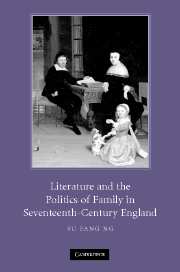Book contents
- Frontmatter
- Contents
- Acknowledgments
- Introduction: strange bedfellows – patriarchalism and revolutionary thought
- PART I REVOLUTIONARY DEBATES
- PART II RESTORATION IMAGININGS
- Interchapter: revolutionary legacies
- 5 Execrable sons and second Adams: family politics in Paradise Lost
- 6 Marriage and monarchy: Margaret Cavendish's Blazing World and the fictions of queenly rule
- 7 Marriage and discipline in early Quakerism
- Epilogue: the family-state analogy's eighteenth-century afterlife
- Index
Interchapter: revolutionary legacies
Published online by Cambridge University Press: 22 September 2009
- Frontmatter
- Contents
- Acknowledgments
- Introduction: strange bedfellows – patriarchalism and revolutionary thought
- PART I REVOLUTIONARY DEBATES
- PART II RESTORATION IMAGININGS
- Interchapter: revolutionary legacies
- 5 Execrable sons and second Adams: family politics in Paradise Lost
- 6 Marriage and monarchy: Margaret Cavendish's Blazing World and the fictions of queenly rule
- 7 Marriage and discipline in early Quakerism
- Epilogue: the family-state analogy's eighteenth-century afterlife
- Index
Summary
With the failure of the republican experiment, Charles II returned to near-universal acclaim. Yet, there was little agreement on what a king was. The Long Parliament, which met from February to March 1660, failed to settle on the form of civil government. When Charles landed at Dover on 25 May 1660, he was bound only by the vague 4 April Declaration of Breda with constitutional issues left unresolved. The question of royal prerogative and its limits continued to trouble relations between king and Parliament. Promising to govern through Parliament, Charles nonetheless held absolutist views on monarchical prerogative. In order to become independent of Parliament, Charles made secret agreements with France in return for subsidies. Both sides were far more wary of each other since the late civil wars: the one fearful of arbitrary government and the other afraid of popular rebellions. Still, unlike his father and his brother James later, who were both deposed, Charles II was an astute politician able to side-step potential crises.
The religious question also continued to haunt the Restoration. Again with no more than the Declaration of Breda as guide, the established church was restored on less than firm ground. Charles promised toleration and forgiveness, declaring “a liberty to tender consciences, and that no man shall be disquieted or called in question for differences of opinion in matters of religion which do not disturb the peace of the kingdom,” though his toleration of nonconformity came from his desire to protect Catholics like his brother James.
- Type
- Chapter
- Information
- Publisher: Cambridge University PressPrint publication year: 2007



